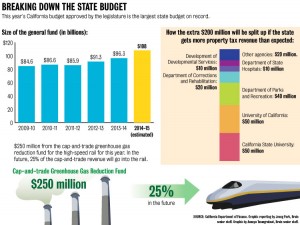 This post was updated on June 22 at 9:16 p.m.
This post was updated on June 22 at 9:16 p.m.
Gov. Jerry Brown signed a $108 billion budget for the state’s general fund on Friday morning, giving the University of California a $142.2 million increase in state funding.
“This on-time budget provides for today and saves for the future,” Brown said in a statement. “We’re paying off the state’s credit card (and) saving for the next rainy day.”
For the UC, the new budget includes a 5 percent increase in state funding, as well as a possible $50 million fund for deferred maintenance or other one-time priorities. The additional funding depends on whether the state gets more property tax than expected by July 1. The UC is receiving about $3 billion in state funding for the 2014-2015 fiscal year. Even if the UC does get the additional funding, it falls short of an additional $124.9 million the UC asked for on top of the 5 percent base increase.
The UC declined to comment on the budget.
Whether the UC will get the additional $50 million in full depends on whether the state receives more property tax revenue than expected by July 1, said Paul Golaszewski, an analyst for the Legislative Analyst Office who specializes in California education.
Next month, if the state calculates it has received $200 million or more in property tax revenue than what was expected under the May Revise budget, the UC will receive the extra $50 million in full. Otherwise, the UC will receive a 25 percent cut of whatever additional revenue the state receives. The UC will not receive more than $50 million in extra funding.
Golaszewski said that though the UC typically should fullyfund deferred maintenance projects, it often delays those projects during economic downturns to save money for academic instruction, leaving the state to address the backlog.
While property taxes mainly fund K-12 education and community colleges, more property taxes allow the state to free up more money for the UC in the state budget, said Paul Warren, a research associate at the Public Policy Institute of California.
The final budget agreement continues Brown’s long-term plan to increase state funding for the UC. The University is scheduled to receive 4 percent increases in the 2015-2016 and 2016-2017 fiscal years.
The plan, which assumes a tuition freeze through the 2016-2017 year, is based on temporary tax hikes approved by voters through Proposition 30, which increased income taxes for individuals who make more than $250,000 and also increased state sales taxes. The temporary tax hikes are scheduled to fully expire in 2018-2019.
Jerry Nickelsburg, senior economist at UCLA Anderson Forecast and adjunct professor at the UCLA Anderson School of Management, said the budget was able to grow to become the largest in history because of the improved economy and $6 billion in additional revenue from Proposition 30. The budget, however, does not clearly show how the state will adapt once it stops receiving funding from Proposition 30, Nickelsburg said.
Few earmarks for higher education spending are in this year’s budget.
The budget includes a $2 million increase in funding for the UCLA and UC Berkeley labor centers, as well as a $2 million allocation to the California Blueprint for Research to Advance Innovations in Neuroscience Act, which aids universities in mapping neurons in the human brain. Another $15 million will go to the establishment of the Behavioral Health Centers of Excellence, which will provide mental health care at UC Davis and UCLA.
Although Brown has the power to veto any spending that he does not want, he exercised this power relatively few times this year and vetoed no spending related to higher education.
The $108 billion budget for the state’s general fund includes $250 million for Brown’s controversial high-speed rail project, about $800 million in increased spending for health and human services agencies and around $1.6 billion for a “rainy-day” fund, a reserve that the state will draw from if it experiences a fiscal downturn.
The budget takes effect on July 1.
The UC will likely discuss the budget at its next Board of Regents meeting in mid-July.
Compiled by Jeong Park, Bruin senior staff.